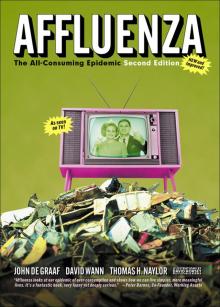Affluenza: The All-Consuming Epidemic 

by John de Graaf; David Wann; Thomas H Naylor; David Horsey; Vicki Robin
Genre: Nonfiction
Published: 2001
View: 3097
Read OnlineRead Affluenza: The All-Consuming Epidemic Storyline:
Amazon.com ReviewIn their eye-opening, soul-prodding look at the excess of American society, the authors of Affluenza include two quotations that encapsulate much of the book: T.S. Eliot's line "We are the hollow men / We are the stuffed men," which opens one of this book's chapters, and a quote from a newspaper article that notes "We are a nation that shouts at a microwave oven to hurry up." If these observations make you grimace at your own ruthless consumption or sigh at the hurried pace of your life, you may already be ill. Read on.The definition of affluenza, according to de Graaf, Wann, and Naylor, is something akin to "a painful, contagious, socially-transmitted condition of overload, debt, anxiety and waste resulting from the dogged pursuit of more." It's a powerful virus running rampant in our society, infecting our souls, affecting our wallets and financial well-being, and threatening to destroy not only the environment but also our families and communities. Having begun life as two PBS programs coproduced by de Graaf, this book takes a hard look at the symptoms of affluenza, the history of its development into an epidemic, and the options for treatment. In examining this pervasive disease in an age when "the urge to splurge continues to surge," the first section is the book's most provocative. According to figures the authors quote and expound upon, Americans each spend more than $21,000 per year on consumer goods, our average rate of saving has fallen from about 10 percent of our income in 1980 to zero in 2000, our credit card indebtedness tripled in the 1990s, more people are filing for bankruptcy each year than graduate from college, and we spend more for trash bags than 90 of the world's 210 countries spend for everything. "To live, we buy," explain the authors--everything from food and good sex to religion and recreation--all the while squelching our intrinsic curiosity, self-motivation, and creativity. They offer historical, political, and socioeconomic reasons that affluenza has taken such strong root in our society, and in the final section, offer practical ideas for change. These use the intriguing stories of those who have already opted for simpler living and who are creatively combating the disease, from making simple habit alterations to taking more in-depth environmental considerations, and from living lightly to managing wealth responsibly. Many books make you think the author has crammed everything he or she knows into it. The feeling you get reading Affluenza is quite different; the authors appear well-read, well-rounded, and intelligent, knowledgeable beyond the content of their book but smart enough to realize that we need a short, sharp jolt to recognize our current ailment. It's a well-worn cliché that money can't buy happiness, but this book will strike a chord with anyone who realizes that more time is more valuable than toys, and that our relentless quest for the latest stuff is breeding sick individuals and sick societies. Affluenza is, in fact, a clarion call for those interested in being part of the solution. --S. KetchumFrom Library JournalDe Graaf, producer of the PBS documentaries Affluenza (1996) and Escape from Affluenza (1998); David Wann, a former EPA staffer and expert on sustainable lifestyles; and Thomas H. Naylor, professor emeritus in economics at Duke, have assembled an updated and more in-depth look at the epidemic of overconsumption sweeping the United States and the rest of the world, based on de Graaf's documentaries. They define "affluenza" as "a painful, contagious, socially-transmitted condition of overload, debt, anxiety, and waste resulting from the dogged pursuit of more" and examine the spiraling cycle of overconsumption, spending, stress, and broken relationships caused by America's obsession with uncontrolled economic growth at any cost. This witty yet hard-hitting book provides evidence of the social problems caused by the American obsession with acquiring "stuff" and proposes solutions for living more sustainably. Highly recommended for academic and public libraries. Mark Bay, Indiana Univ.Purdue Univ. Lib., Indianapolis Copyright 2001 Reed Business Information, Inc.Pages of Affluenza: The All-Consuming Epidemic :